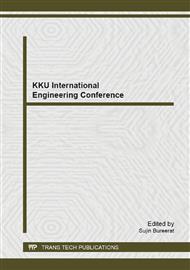p.1106
p.1111
p.1117
p.1122
p.1129
p.1134
p.1139
p.1144
p.1149
Differential Evolution Algorithm for Solving a Nonlinear Single Pendulum Problem
Abstract:
A differential evolution (DE) algorithm has been employed to approximate the solution of a nonlinear single pendulum equation. The solution has been approximated as a Fourier series expansion form. Then, weighted-residual and penalty functions are employed to transform the problem into a constrained optimization problem while optimum solutions will be carried out by DE. This paper also studies an effect of a scaling factor of DE to the results. The results reveal that the scaling factor significantly affects the convergent speed and accuracy of DE. Approximate solutions well agree with the exact solutions for the scaling factor being 0.5.
Info:
Periodical:
Pages:
1129-1133
Citation:
Online since:
May 2014
Authors:
Price:
Сopyright:
© 2014 Trans Tech Publications Ltd. All Rights Reserved
Share:
Citation:


